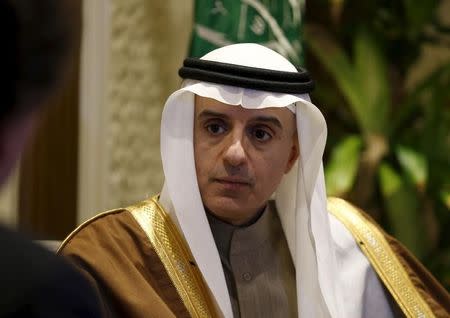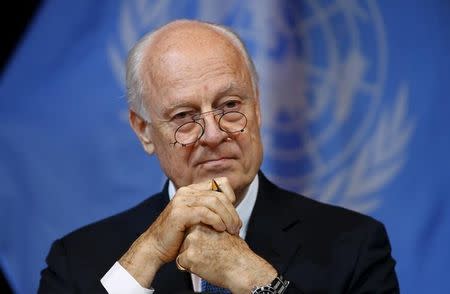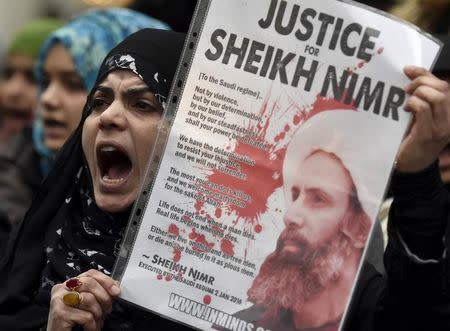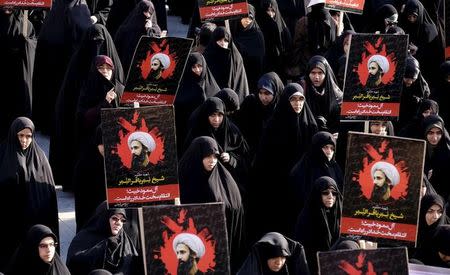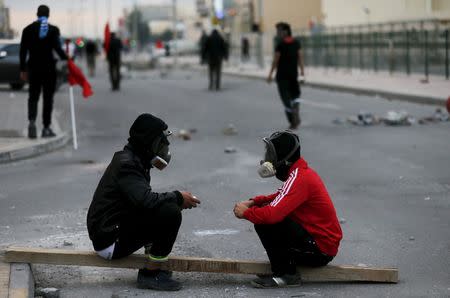Saudis signal backing for Syria talks despite row with Iran
GENEVA (Reuters) - Saudi Arabia signaled on Tuesday that the breach in its relations with Iran would not affect talks on Syria, another round of which is scheduled in Geneva this month. Riyadh and Tehran, which support opposing sides in the Syrian civil war, have attended previous talks on the conflict but there is concern that the new rift between the arch rivals could set back diplomatic efforts to bring peace to Syria. Speaking after talks in Riyadh with U.N. special envoy for Syria Staffan de Mistura, Foreign Minister Adel al-Jubeir was quoted as saying by the official Saudi Press Agency (SPA): "The recent tensions that impacted the region negatively will not affect ... the operations that the United Nations carries out alongside the international community to achieve a political solution in Geneva soon." Saudi Arabia and some other Sunni Arab countries have broken all ties with Iran after protesters in Tehran stormed the Saudi embassy in protest over Riyadh's execution of a Shi'ite Muslim cleric. Restating the kingdom's position on Syria, Jubeir said Riyadh sought a solution based on the Geneva 1 communique, a 2012 document setting out guidelines for a path to peace including a transitional governing authority, SPA said. He reiterated that Syrian President Bashar al-Assad could have no role in the future of his country, SPA said. Syrian opposition leaders told de Mistura that Damascus must take confidence-building steps including a prisoner release and a halt to attacks on civilian areas before they will go to negotiations. The United Nations has set a target date of Jan. 25 for the talks. But Damascus has dismissed a new opposition body formed to oversee negotiations, and the opposition wants to see confidence-building steps from President Bashar al-Assad, a demand that could complicate efforts to start talks. KEEPING UP THE MOMENTUM De Mistura, speaking after he met the Syrian opposition in Riyadh, said there was a clear determination on the Saudi side that current regional tensions would not have a negative impact on the momentum of the talks and on the continuation of the political process in Geneva. De Mistura did not characterize the position of the Syrian opposition at the meeting, but said: "We cannot afford to lose this momentum despite what is going on in the region." The opposition wants the government to lift blockades imposed on rebel-held areas, to release detainees and to stop dropping barrel bombs before they will attend the negotiations, officials said on Tuesday. "The opposition's position is unified," one of them told Reuters, declining to be named because he is not an official spokesman for the opposition body. Britain's Special Representative for Syria on Tuesday urged the Damascus government to lift sieges as a step towards ending the nearly five-year-old conflict. "Starving civilians is an inhuman tactic used by the Assad regime and their allies," Gareth Bayley said in a statement, referring to a months-long blockade in the town of Madaya, near Damascus. "Sieges must be lifted to save civilian lives and to bring Syria closer to peace ... This human tragedy underscores the need for an end to this conflict." The British-based Syrian Observatory for Human Rights has said many of Madaya's 40,000 residents are starving. (Reporting by Stephanie Nebehay; additional reporting by John Davison and Tom Perry in Beirut, Omar Fahmy in Cairo and Hadeel al Sayegh in Dubai; Editing by William Maclean and Gareth Jones)
